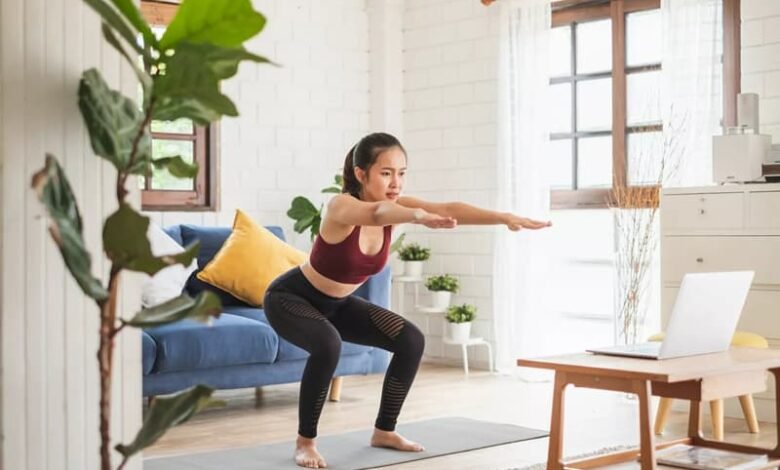Best Home Workouts Without Equipment for Beginners (2025 Guide)

The notion of fitness no longer belongs solely to bustling gyms filled with machines and weights. Within the sanctuary of one’s home, movement becomes personal, intimate, and profoundly adaptable. For beginners, the
absence of equipment is not a limitation but an invitation to discover strength using only the human body.
The Advantages of Equipment-Free Workouts

Convenience and Accessibility
One of the most alluring aspects is the sheer convenience. No commute, no waiting for machines, no excuses. A living room, a small bedroom corner, or even a backyard suffices.
Cost-Effective Fitness
Skip the pricey gym memberships and the clutter of machines. The investment is nothing but time, discipline, and commitment.
Natural Body Movement Focus
Working without weights emphasizes primal movement patterns. This ensures strength emerges naturally, aligning with how the body was designed to move.
Preparing Your Space for Home Workouts

Clearing and Organizing a Safe Area
A clutter-free space reduces distractions and hazards. A small yoga mat or carpet is all you truly need.
Using Household Items Creatively
A sturdy chair transforms into a workout ally for dips. A towel can double as a slider. Creativity replaces fancy equipment.
Setting the Right Ambience
Good lighting, a motivating playlist, or even silence tailored to your mood can enhance focus and energy.
Warming Up the Body

Dynamic Stretches for Beginners
Arm circles, leg swings, and torso twists awaken muscles. This primes the body for exertion.
Mobility Exercises to Prevent Injury
Hip openers and ankle rolls prepare joints, reducing strain and keeping movements fluid.
Upper Body Exercises Without Equipment

Push-Up Variations
Begin with knee push-ups, progress to standard, and explore incline or decline versions. These sculpt the chest, arms, and shoulders.
Tricep Dips Using a Chair
Hands gripping the edge of a chair, lower and lift with control. It ignites the back of the arms.
Shoulder Taps for Stability
In a plank position, alternate tapping shoulders. Core bracing builds balance and shoulder endurance.
Core Strengthening Workouts

Plank and Its Modifications
The plank is foundational. Side planks and forearm planks engage deeper stabilizing muscles.
Bicycle Crunches for Oblique Activation
Slow and deliberate, each rotation tightens and tones the sides of the abdomen.
Leg Raises for Lower Abdominal Strength
Lift with control, resisting momentum. The lower abs awaken with each repetition.
Lower Body Exercises Without Equipment

Squats and Their Variations
From air squats to sumo stances, these target thighs and glutes, fueling everyday movement strength.
Lunges for Balance and Strength
Forward, backward, or walking lunges improve stability and coordination.
Glute Bridges for Hip Activation
Lying down, pressing hips upward, builds glute and lower back resilience.
Full-Body Movements for Beginners

Burpees Made Simple
A modified version without the push-up or jump still ignites cardiovascular endurance.
Mountain Climbers for Endurance
Quick knee drives in a plank elevate the heart rate and test stamina.
Jumping Jacks as a Classic Choice
This timeless move lifts energy and primes the entire body.
Flexibility and Recovery Exercises

Static Stretching Techniques
Post-workout, holding stretches lengthens muscles and fosters relaxation.
Yoga-Inspired Poses for Beginners
Child’s pose, cat-cow, and downward dog ease tension while improving flexibility.
Structuring a Beginner-Friendly Workout Routine

Repetitions and Sets Explained
Start with 2–3 sets of 8–12 reps. Consistency matters more than quantity at the outset.
Balancing Intensity with Rest
Short breaks between sets restore energy, preventing burnout while encouraging steady progress.
Common Mistakes Beginners Should Avoid

Overtraining Too Early
Ambition can lead to fatigue. Growth requires patience.
Neglecting Proper Form
Rushing invites injury. Precision ensures progress.
Skipping Recovery Sessions
Rest is not laziness, it is where the body rebuilds and strengthens.
Motivational Tips to Stay Consistent

Setting Achievable Milestones
Micro goals, like holding a plank for 20 seconds longer, sustain enthusiasm.
Tracking Progress Without Gadgets
A notebook, simple tallies, or a photo log keeps progress tangible.
Finding Joy in Small Victories
Celebrate every completed session. Momentum thrives on recognition.
Adapting Workouts as You Progress

Increasing Reps and Sets
Gradual increments prevent stagnation and spark fresh growth.
Exploring Advanced Variations
Single-leg squats or decline push-ups add challenge and novelty.
Adding Time-Based Challenges
Timed planks or endurance circuits cultivate stamina and mental grit.
The Role of Nutrition in Supporting Workouts

Hydration for Energy and Recovery
Water replenishes and revitalizes. Dehydration hinders performance.
Balanced Meals to Aid Muscle Growth
Proteins, complex carbs, and healthy fats work synergistically for recovery and strength.
Mental Benefits of Home Workouts
Stress Reduction and Mind Clarity
Movement eases tension, calming the nervous system and sharpening focus.
Building Discipline and Confidence
Consistency in workouts spills over into other life pursuits.
Safety Considerations During Home Workouts

Listening to Your Body’s Signals
Pain is not progress. Discomfort can guide, but sharp pain demands rest.
Creating a Supportive Environment
Supportive flooring, adequate ventilation, and safe surfaces prevent mishaps.
Short Daily Workout Plan for Beginners

A 15-minute circuit:
10 squats
8 push-ups
20-second plank
10 lunges per leg
20 jumping jacks
Repeat twice.
Weekly Routine Example Without Equipment

Day 1: Full-body circuit
Day 2: Core and flexibility focus
Day 3: Rest or light stretching
Day 4: Lower body emphasis
Day 5: Upper body and cardio moves
Day 6: Mixed endurance circuit
Day 7: Rest and recovery practices
When to Seek Professional Guidance
Persistent pain, lack of progress, or the desire for personalized plans warrant professional advice. Trainers or physiotherapists can refine your path.
Conclusion: A Journey Toward Sustainable Fitness
Embarking on a home workout journey without equipment illuminates the body’s innate capacity for strength and vitality. Simplicity becomes powerful. With dedication, patience, and a willingness to evolve, beginners transform daily efforts into a sustainable lifestyle one that honors both body and mind.
